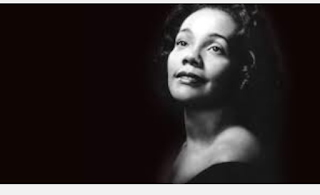"Coretta Scott was born on 27 April 1927, near Marion, Alabama. Her parents, Obadiah ‘‘Obie’’ Scott and Bernice McMurray Scott, were farm owners committed to ensuring that their children received the best education possible. Scott attended the private Lincoln High School in Marion, where she developed her interest in music. There she took formal vocal lessons, learned to read music, and played several instruments. By the age of 15, she had become the choir director and pianist of her church’s junior choir.
"After graduating from Lincoln, Scott won a partial scholarship to Antioch College, in Yellow Springs, Ohio, the same university her sister Edythe had attended as the first African American student. While at Antioch, Scott studied voice and music education. She also became a member of the local chapter of the National Association for the Advancement of Colored People, as well as the Race Relations and Civil Liberties Committees. In an article, ‘‘Why I Came to College,’’ published in Opportunity in 1948, Scott wrote that college graduates, ‘‘had greater freedom of movement: they went on trips; they visited cities; they knew more about the world’’ (Scott, 42). She later credited Antioch with preparing her for her role in the civil rights movement, stating that ‘‘the college’s emphasis on service to mankind reinforced the Christian spirit of giving and sharing’’ and provided ‘‘a new self-assurance that encouraged me in competition with all people’’ (Scott King, 43).
"In 1951, Scott enrolled in Boston’s New England Conservatory of Music with a grant from the Jessie Smith Noyes Foundation. In early 1952, her friend Mary Powell introduced her to King, then a doctoral candidate at Boston University’s School of Theology. While initially wary of dating a Baptist minister, she was impressed by his sophistication and intellect and recalled King telling her: ‘‘You have everything I have ever wanted in a wife’’ (Scott King, 53). The two were married at the Scott family home near Marion on 18 June 1953. After the wedding, they returned to Boston to complete their degrees. Coretta Scott King earned her bachelor of music degree in June 1954.
"Although Scott King was focused on raising the couple’s four children: Yolanda Denise King (1955), Martin Luther King, III (1957), Dexter Scott King (1961), and Bernice Albertine King (1963), she continued to play a critical role in many of the civil rights campaigns of the 1950s and 1960s, performing in freedom concerts that included poetry recitation, singing, and lectures related to the history of the civil rights movement. The proceeds from these concerts were donated to the Southern Christian Leadership Conference.
"After King’s assassination on 4 April 1968, Coretta Scott King devoted much of her life to spreading her husband’s philosophy of nonviolence. Just days after his death, she led a march on behalf of sanitation workers in Memphis, Tennessee. Later that month, she stood in for her husband at an anti–Vietnam War rally in New York. In May 1968, she helped to launch the Poor People’s Campaign, and thereafter participated in numerous anti-poverty efforts."
"With a deep commitment to preserving King’s legacy, almost immediately Coretta Scott King began mobilizing support for the Martin Luther King, Jr. Center for Nonviolent Social Change. As founding president of the King Center, she guided its construction next to Ebenezer Baptist Church, where King had served as co-pastor with his father, Martin Luther King, Sr.
"Throughout the 1970s and 1980s, Scott King continued to speak publicly and write nationally syndicated columns, and began efforts to establish a national holiday in honor of her husband. In 1983, she led an effort that brought more than a half-million demonstrators to Washington, D.C., to commemorate the 20th anniversary of the 1963 March on Washington for Jobs and Freedom, where King had delivered his famous ‘‘I Have a Dream’’ speech. As chairperson of the Martin Luther King, Jr. Federal Holiday Commission, she successfully formalized plans for the annual celebration of Martin Luther King, Jr. Day, which began in January 1986."
"During the 1980’s, Coretta Scott King reaffirmed her long-standing opposition to South African apartheid, participating in a series of sit-in protests in Washington that prompted nationwide demonstrations against South African racial policies. In 1986, she traveled to South Africa and met with Winnie Mandela. She also remained active in various women’s organizations, including the National Organization for Women, the Women’s International League for Peace and Freedom, and United Church Women."
"Throughout her life, Coretta Scott King carried the message of nonviolence and social justice to almost every corner of the globe. On 30 January 2006, Coretta Scott King died in her sleep at a holistic health center in Rosarito Beach, Mexico. She was 78 years old. "
Martin Luther King Jr. ... - http://kingencyclopedia.stanford.edu/encyclopedia/encyclopedia/enc_king_coretta_scott_1927_2006/
About Mrs. King - http://www.thekingcenter.org/about-mrs-king
www.history.com -- http://www.history.com/topics/coretta-scott-king
biography.com -- http://www.biography.com/people/coretta-scott-king-9542067#synopsis
The King Center - http://www.thekingcenter.org/about-mrs-king
SOURCES At King Encyclopedia Stanford University - see link above
Introduction in Papers 2:12–14, 19.
King, Stride Toward Freedom, 1958.
(Scott) King, My Life with Martin Luther King, Jr., 1969.
Scott, ‘‘Why I Came to College,’’ Opportunity 26 (1948): 42, 70.







No comments:
Post a Comment